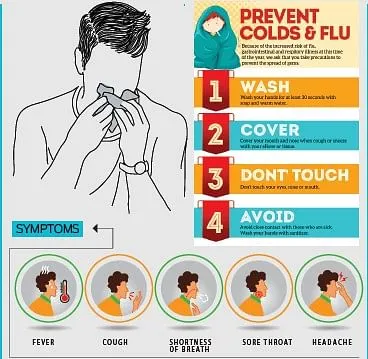About H3N2 Infection:
H3N2 is a subtype of the influenza A virus that can cause seasonal flu. In Kashmir, senior citizens are at a higher risk of developing H3N2 infection due to their weakened immune system and underlying comorbidities making them more susceptible to the virus.
This virus spreads from person to person through respiratory droplets when an infected person coughs or sneezes.
The virus can survive on surfaces for up to 24 hours, making it easy to contract the virus through contaminated surfaces.
H3N2 virus is a type of seasonal flu that circulates in humans and can cause illness ranging from mild to severe.
Incubation Period:
The incubation period for H3N2 infection is typically between 1 to 4 days. During this time, infected individuals may not experience any symptoms but can still spread the virus to others. Once symptoms develop, infected individuals may continue to spread the virus for up to 7 days after symptoms first appear.
Symptoms:
Symptoms of H3N2 infection in seniors include fever, cough, sore throat, body aches, headache, fatigue, breathlessness, nausea, vomiting, and even diarrhea. In some elderly, confusion or changes in mental status may also occur and infection can lead to more severe complications such as pneumonia or respiratory failure, particularly in high-risk groups such as seniors with underlying health conditions.
The duration of H3N2 infection can vary from person to person, but in general, the illness can last for several days to a week or even more. The severity of symptoms can also vary widely, with some people experiencing mild symptoms while others may have more severe symptoms that can last longer.
Treatment:
Evidence suggests that some antiviral drugs can reduce the duration of viral replication and improve prospects of survival and can reduce the severity and duration of symptoms and prevent complications. Antiviral treatment is most effective when started within 48 hours of symptom onset. In addition to antiviral medication, seniors with H3N2 infection may require supportive care such as hydration, rest, and management of symptoms such as fever and cough.
Complications:
Seniors with H3N2 infection are at risk of serious complications such as pneumonia, dehydration, or worsening of underlying health conditions like heart disease, lung disease, or diabetes. They may also be at risk of falls due to weakness and dizziness. If left untreated, H3N2 infection can lead to hospitalisation.
Prevention:
} Yearly Flu Vaccine is the most effective way to prevent H3N2 infection, its severity and complications
} Regular hand washing with proper drying of the hands
} Good respiratory hygiene – covering mouth and nose when coughing or sneezing, using tissues and disposing of them correctly
} Early self-isolation of those feeling unwell, feverish and having other symptoms of influenza
} Avoiding close contact with sick people
} Avoiding touching one’s eyes, nose or mouth
} Make sure to get plenty of rest, eat a balanced diet, and exercise regularly to keep their immune system strong.
} Ensure adequate ventilation in the rooms.
Role of Antibiotics:
Antibiotics are not effective against H3N2 influenza, which is a viral infection. Antibiotics only work against bacterial infections, and they are not effective against viral infections.
However, in some cases, people with H3N2 infection may develop secondary bacterial infections, such as pneumonia, which may require antibiotics to treat. In such cases, antibiotics may be prescribed only by your doctor.
It is important to note that overuse or misuse of antibiotics can contribute to the development of antibiotic-resistant bacteria, which can be more difficult to treat and pose a significant public health threat.
Disclaimer: The views and opinions expressed in this article are the personal opinions of the author.
The facts, analysis, assumptions and perspective appearing in the article do not reflect the views of GK







